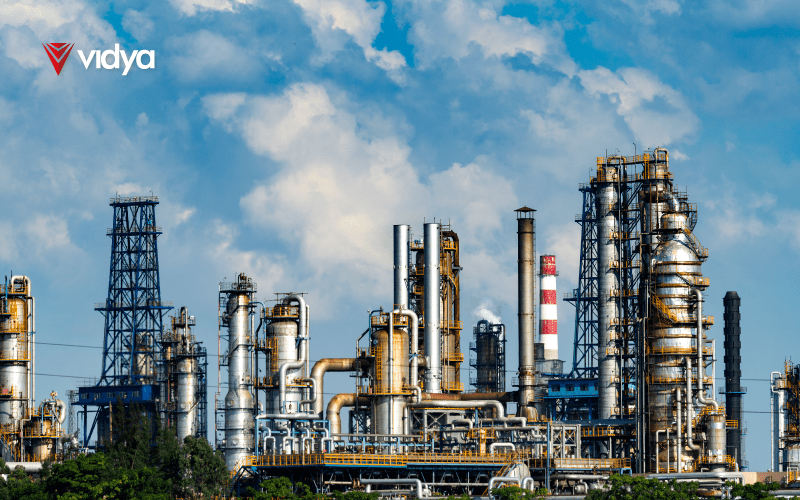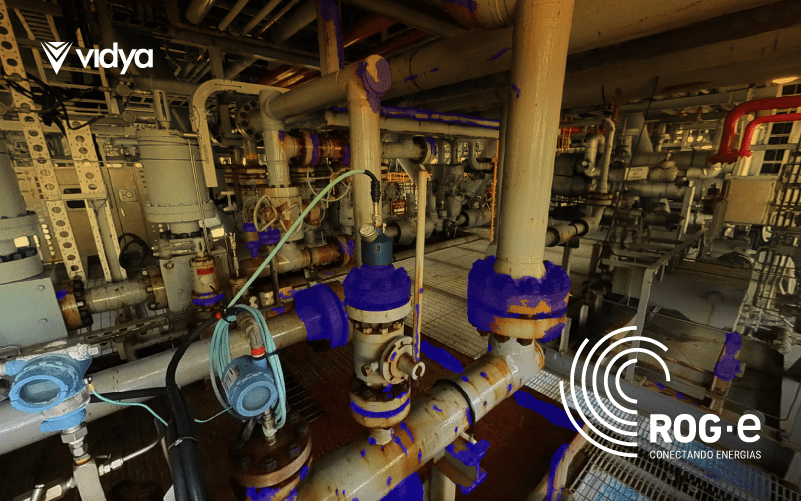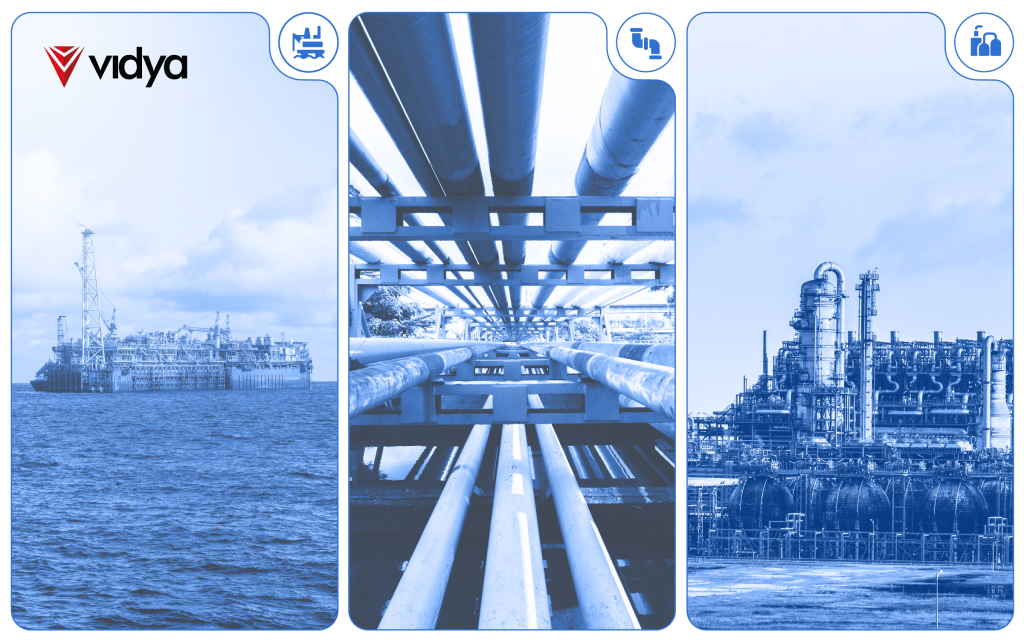According to McKinsey, oil refineries can process nearly 100 million barrels of crude oil globally daily. Thus, given the presence and scalability of oil-derived products, downstream operations—industries responsible for transforming crude oil into fuels—may be the heart of the petroleum value chain. In comparison, the heart’s role doesn’t limit itself to pumping blood just as a petrochemical plant does to refining oil. Both are crucial to filtering impurities and fueling energy for the whole organism.
Downstream: The heart of the Petroleum Value Chain
Deepening the analogy, the heart receives deoxygenated blood from the body, sends it to the lungs for oxygenation, and pumps the oxygen-rich blood back out to fuel the body with energy. Likewise, oil refineries take in crude oil—a raw, unrefined resource—and transform it into refined products. These products are then distributed across various sectors, powering everything from cars and planes to manufacturing plants and homes.
In this regard, petrochemical operations aim to process crude oil and natural gas into products like gasoline, diesel, jet fuel, and heating oil –just like turning deoxygenated blood into oxygen-rich blood. Still, as simple as it may seem, these operations are characterized by employing high-risk techniques involving heating, distillation, and pressure tanks to achieve the final product. Thus, the complexity of this sector requires assets, technology, and processes more varied and specific than those in the extraction phase, referred to as the upstream sector.
Upstream: The Lungs of Petroleum
If petrochemical operations represent the heart of the oil value chain, upstream operations may be the lungs. This sector is responsible for extracting crude oil from reservoirs, storing it, and sending it to refineries. In the same way, the lungs collect oxygen from the environment and send it to capillary vessels and alveoli so the heart can pump oxygenated blood to the whole body. Indeed, just like these two different organs, the downstream and the upstream have their specificities and challenges. In this manner, what factors stand out while managing downstream operations?
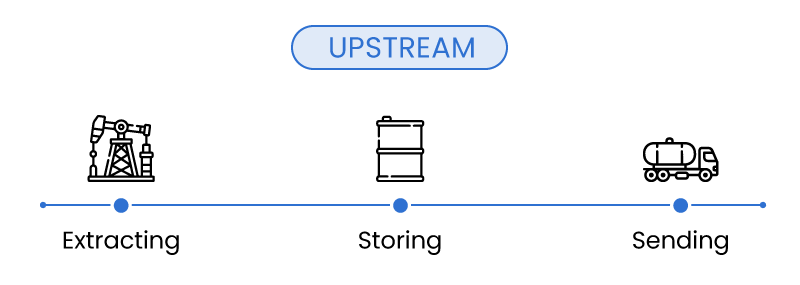
Downstream challenges
From compressors to reactors and distillation columns, the downstream challenges are more related to precisely controlling chemical reactions, energy consumption, heat transfer, and fluid dynamics to maintain the quality and safety of products. According to the article ‘’Challenges and Technological Opportunities for the Oil Refining Industry: A Brazilian Refinery Case’’, besides having to deal with declining demands due to the energy transition, downstream operations are required to lower fossil fuel consumption, CO2 emissions, and heavy residue production while delivering better fuels.
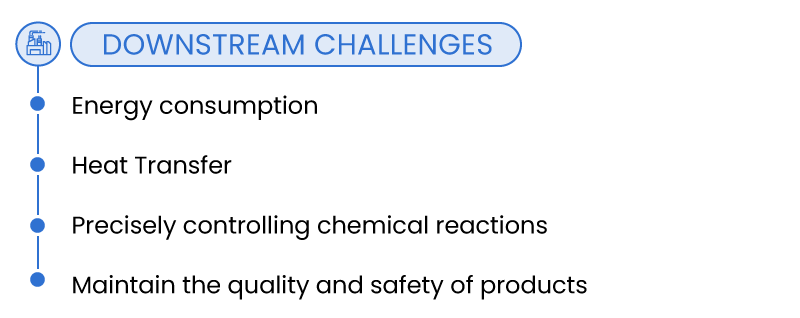
1. Energy consumption
Downstream operations are incredibly energy-intensive, with processes like distillation, cracking, and reforming requiring significant heat and power. According to S&P Global, the global refining industry consumes about 5% of the world’s total energy. Yet, the cumulative energy needed for these activities impacts both the refinery’s carbon footprint and the costs. For this reason, inefficiencies can lead to reduced profitability, especially in a competitive market where margins are often tight.

Beyond the direct energy required for refining processes, downstream operations must also consider the energy efficiency of their overall systems. This includes optimizing the use of heat recovery systems, improving insulation in pipelines and reactors, and investing in advanced process control technologies that can reduce energy waste. As the global push for sustainability intensifies, petrochemical industries must constantly adapt to stay competitive.
2. Quality control
Maintaining high-quality standards in downstream operations is as critical as managing energy consumption, given the complexity and precision required in refining processes. The slightest deviation in temperature, pressure, or chemical composition can result in products that fail to meet industry specifications or safety standards. Still, besides maintaining the required temperature and pressure levels, operations must manage fluid dynamics meticulously.
Within this scenario, the fuel quality is closely tied to the management of fluid dynamics, once the movement and behavior of liquids and gasses are critical factors that influence the final product’s quality. Furthermore, controlling fluid dynamics is essential for ensuring that the various processes—such as distillation, cracking, and reforming—operate at optimal efficiency. Effective control of fluid flows ensures that chemicals are separated precisely and that each stage of the refining process operates smoothly.
3. Asset Integrity
Asset integrity refers to the ability of equipment and infrastructure to perform their intended functions effectively and safely over their lifecycle. And despite all sorts of industries being concerned with asset integrity, every sector has its specific indicators and prioritized activities regarding equipment maintenance. According to the Inspectioneering Journal, a single day of downtime at a large petrochemical plant can result in losses of up to $1 million.
In this manner, refineries are subjected to harsh conditions, high temperatures, pressures, and corrosive materials that can accelerate wear and tear on machinery. For this reason, ensuring that all equipment is regularly inspected, maintained, and upgraded is critical to preventing breakdowns. As a result, rigorous and regular inspection, maintenance, and scheduled upgrades of all machinery are essential to ensure operational continuity and safety.
Conclusion
Just as the heart is indispensable to the vitality of a living organism, downstream operations are crucial to the robustness and efficiency of the petroleum value chain. By transforming raw crude oil into several essential products, downstream processes ensure that energy fuels every aspect of modern life, from transportation and industry to heating and beyond. Essentially, in a landscape where production processes are ever more dependent on precision, refineries, like the heart, must consistently ensure the flow of high-quality, energy-rich products to fuel global energy needs.
